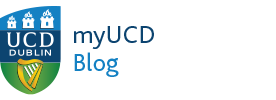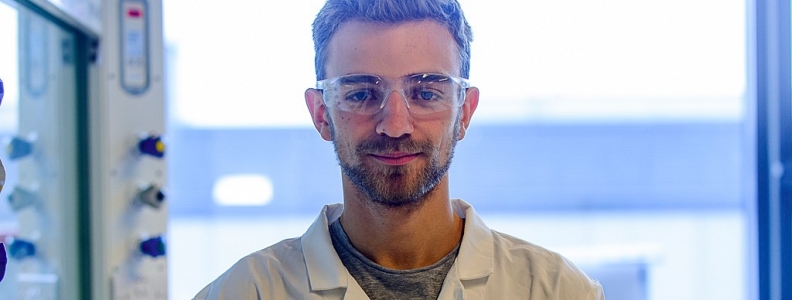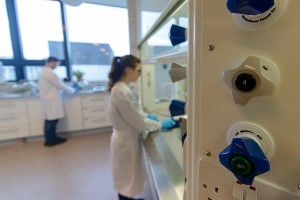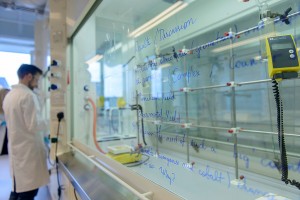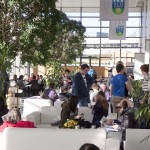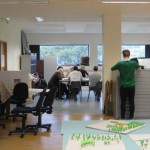Final year Chemistry student Andrew describes his experiences studying Chemistry in UCD…
Like a lot of people, I had no idea what I wanted to do in science. I had really liked maths for the Leaving Cert and I had only done Biology as a science subject. So straight away I thought I would do either Maths or Biology. However, after two weeks, I realized I didn’t like either as much as I thought. Disaster! I thought I had messed up and was now confined to MPG (Physics, Maths & Education). Luckily I had taken an Introductory Chemistry module just to keep my options open. I loved it. The lecturer, Dr. Mike Casey, was great. He was always happy and enthusiastic. I decided to go to the Science Programme Office and change from MPG to No Preference. I swapped some of my Biology and Maths modules for Chemistry and Geology modules. Even though I hadn’t seen Chemistry since the Junior Cert science I wasn’t phased at all. I really enjoyed the lectures and the labs.
Along came Second Year and I started to veer closer towards Chemistry. It was the right decision. The lectures were even more interesting, the labs were challenging and stimulating. Even though the material was tougher, the lecturers were all so approachable and made great efforts to facilitate us that it was difficult not to learn. We also had postgraduates to demonstrate and help us in the labs and be our tutors to aid with the course material. We could tell that everybody wanted us to do well. Second Year really sealed the deal. I knew I was doing the best degree for me. So I chose Chemistry as my major.
Third year was definitely a huge step up. It was business time. The learning material, the labs, and the tutorials all became tougher. But it was all so compelling. We began learning about the inner workings of instrumental analysis such as HPLC (High Performance Liquid Chromatography) and NMR (Nuclear Magnetic Resonance) spectroscopy. We began to expend our knowledge of mechanisms, stereochemistry, and carbonyl chemistry.
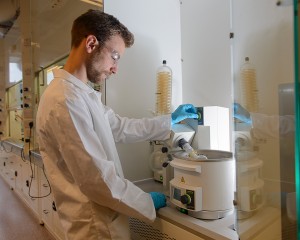
Besides exams, we had two ways of being assessed – labs and tutorials. The labs typically take up about 30% of your continuous assessment, while the tutorials 10%. Our labs, like our modules, covered three main aspects of chemistry – Physical, Organic and Inorganic. Each aspect was challenging for a variety of reasons. They required different techniques and a different mind-set.
As much as I enjoyed the physical labs, the organic and inorganic labs were my favourite part of third year. At first 6 hour labs sounds unappealing but they were great. In the first week, we received our manuals with all our experiments for the semester. Before each lab, we were required to cover all safety and precautionary aspects of each experiment. We were required to use more volatile chemicals than previous years and several experiments would be performed under vacuum or anaerobically, i.e. in an inert atmosphere such as Nitrogen gas. We had more independence and more responsibility.
Nevertheless, the lecturers and demonstrators were close by to help if needed. A big change from second to third year was that we were not only getting a product we were analysing it too. One of the greatest joys of being a chemistry student is when you’ve worked really hard in a lab synthesizing and isolating a product and then analysing it to find, firstly it’s the correct product, and secondly that it’s pure. It really makes all the hard work worth it knowing you’ve done a good job.
Personally, I found tutorials really helpful because at times I found myself taking notes and understanding the lectures, but I was never really sure how much I knew until we received a tutorial problem sheet. These typically consisted of problems similar to homework in secondary school but we would have about a week or two to complete them. They test your knowledge of the lecture material and your ability to back-up your knowledge with references to academic papers. When we attended a tutorial class, they were either held by the lecturer themselves or a postgraduate. These were very insightful! The lecturer or postgraduate would go through the tutorial answers and make sure everybody understood what was being asked. Tutorials are also a perfect time to ask any questions you have about the learning material.
As for me, I’m now in my final year. As scary, as it is I am comforted by the fact that I have support if needed. I am not sure what I will pursue once I am finished but my two main ideas are to head straight into industry and begin working full-time or to stay in academia and aim for a PhD. I am hoping that after this year I will lean one way or another but only time will tell which way I go.

